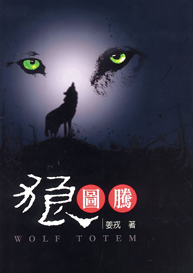《狼圖騰》姜戎著 (Wolf Totem by Jiang Rong)
|
Speaker : |
Ms Mabel Cheung Yuen Ting 張婉婷女士 (Film director 導演) |
|
Moderator: |
Dr Elaine K. M. Chan 陳劍梅博士 (Film scholar 電影學者) |
|
Guest Moderator: |
Mr Yau Ching-yuen 游清源先生 (Deputy Chief Editor of Hong Kong Economic Journal 《信報財經新聞》 副總編輯) |
|
Date : |
28 February 2012 (Tuesday) |
|
Time : |
7:15 - 9:00 pm |
|
Venue : |
Special Collections, 1/F, Main Library, The University of Hong Kong |
|
Language : |
Cantonese (廣東話) |
About the Speaker
|
|
Ms Cheung graduated from HKU with a Bachelor of Arts in English Literature and Psychology, then continued her studies first in the UK, at Bristol University where she received an Advanced Diploma in Drama and Visual Arts, and subsequently in the US, where she received an MFA from the New York University Graduate Film School.
Ms Cheung is one of Hong Kong’s finest film producers and directors, and has received international recognition for her work, including from the Hong Kong Films Awards, the Asia-Pacific Film Festival, the Golden Horse Film Festival and Awards. She was awarded the prestigious Crystal Bear for Best Film at the 2010 Berlin International Film Festival, for the film Echoes of the Rainbow (歲月神偷). Her professional recognition also includes being a member of the Hong Kong Film Development Council.
張婉婷女士是著名電影導演﹐其作品「秋天的童話」、「七小福」﹐分別獲香港電影金像獎、台灣金馬獎及多個國際電影獎項。
她在香港大學取得學士學位後﹐曾負笈英國及美國進修﹐但張婉婷對港大生活深有感情﹐曾拍攝電影「玻璃之城」﹐細緻描述早年的何東堂舍堂生活及情懷﹐張婉婷亦積極支持母校的活動﹐包括擔任師友計劃的導師﹐輔助後學﹐亦多次應邀出席講座及高桌晚宴。 |
About the Moderator
|
Elaine Chan taught undergraduate and post-graduate courses at Lingnan University, The Chinese University of Hong Kong, and Hong Kong Polytechnic University in the areas of film and cinema studies and Hong Kong popular culture respectively between 2005 and 2010. She also developed and co-taught General Education programmes at the University of Hong Kong between 2007 and 2011. She received her Ph.D. at the University of Kent, UK. Her areas of research include cinema studies, cultural theories, gender politics and popular culture. Her articles appeared in journals and newspapers such as Journal of Chinese Cinemas, Crossover, Film Bi-weekly, Ming Pao, and Hong Kong Economic Times. She was also director and producer of television commercials and documentaries.
陳劍梅博士於2007至2011年間為香港大學通識教育主任,2005至2007及2007至2011年間分別任教於香港嶺南大學、香港中文大學及香港理工大學。她於英國肯特大學獲取博士學位,其學術研究範疇包括電影、文化理論、性別研究及流行文化等,學術專論刊於Journal of Chinese Cinemas,文化及電影評論刊於越界、電影雙週刊、明報及香港經濟日報等。 她亦曾擔任電視廣告及紀錄片的導演及製片人。 |
About the Guest Moderator
|
Mr Yau graduated from HKU with a Bachelor in Arts in Chinese. He was the President of HKU Student Union in 1986. Mr Yau is a veteran editor, radio host and columnist. He is Deputy Chief Editor of Hong Kong Economic Journal.
游清源先生畢業於香港大學中文系,於1986年任港大學生會會長。 香港資深編輯、電台主持及專欄作家,現任《信報財經新聞》副總編輯。 |
About the Book
|
|
《狼圖騰》 是中國作家姜戎於2005年出版的中文著作,內容主要圍繞蒙古草原有關野狼的各種神秘傳說及真實故事,透過野狼如何在滿佈強敵的環境之下,怎樣去運用計謀令自己得以繼續存活,藉此使讀者反思人生、經濟、環保及民族性等課題。 《狼圖騰》也是一部爭議很大的書,有西方學者斥其為“法西斯主義”,甚至有黑社會將其當做教科書。
Wolf Totem is narrated by protagonist Chen Zhen, a young man in his 20s who, like the author, left his native Beijing to work in Inner Mongolia during the cultural revolution. Through descriptions of folk traditions, rituals, and life on the steppe, Wolf Totem compares the culture of the ethnic Mongolian nomads and the Han Chinese farmers in the area, praising the "freedom, independence, respect, unyielding before hardship, teamwork and competition" of the former and criticising the "Confucian-inspired culture" of the latter, which the author referred to as "sheeplike". The book condemns the agricultural collectivisation imposed on the nomads by the settlers, and the ecological disasters it caused, and ends with a 60-page "call to action" disconnected from the main thread of the novel. The author states that he was inspired to begin writing Wolf Totem by an accident: he ignored the advice of the clan chief of the group of nomads with whom he was staying, and accidentally stumbled across a pack of wolves. Terrified, he watched as the wolves chased a herd of sheep off a cliff, then dragged their corpses into a cave. From then on, fascinated by the wolves, he began to study them and their relationship with the nomads more closely, and even attempted to domesticate one. |



